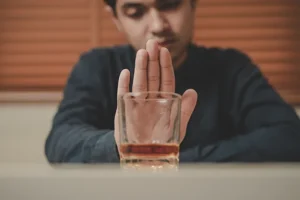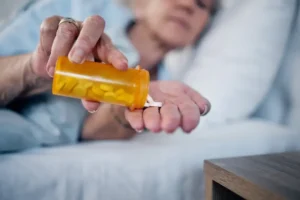Overcoming addiction is often more challenging than expected, no matter if it’s alcohol, substances, or behavioral dependencies. The journey to recovery is not just about quitting a habit; it’s about transforming your life, which can feel daunting at first.
In this blog, we’ll delve into why breaking free from addiction is so tough and provide you with effective strategies to overcome it.
Whether you’re battling this yourself or supporting a loved one, this blog will equip you with the knowledge and tools you need to start on the path to recovery. Let’s begin this transformative journey together and work towards a healthier, happier you.
Contents
Why Is Quitting Addiction So Hard?
 Quitting an addiction is challenging because it’s about more than just stopping a habit. Here’s why it can be so tough:
Quitting an addiction is challenging because it’s about more than just stopping a habit. Here’s why it can be so tough:
- Physical Dependence
Substances like alcohol or drugs can make your body depend on them to feel normal. When you stop using them, your body can react badly, leading to withdrawal symptoms that are hard to handle without help. - Psychological Effects
Addictions can mess with your brain’s reward system. You might feel a strong need to use the substance to get a feeling of pleasure or to avoid feeling bad. This makes quitting feel nearly impossible at times. - Emotional Ties
For many, the addictive behavior is a way to deal with emotional pain. Without it, you might feel more stressed or sad. This makes it hard to let go of the addiction. - Environment and Habits
Places, people, or routines linked to your addiction can trigger strong cravings. Changing these patterns isn’t easy and often requires big adjustments in your life. - Social and Cultural Pressure
Sometimes, the people around you or societal expectations can make it harder to seek help. You might worry about being judged or not fitting in.
Quitting addiction involves breaking physical needs, changing deep-set habits, and finding new ways to handle emotions and stress. It’s hard, but with the right support and strategies, it’s definitely possible.
How To Overcome Addiction: Easy Tips

Create a Supportive Environment
A supportive environment is crucial when overcoming addiction. Here’s how you can create a supportive environment that fosters successful recovery:
Engage Your Family and Friends
- Encourage honest dialogue with your family and friends about your struggles and recovery goals.
- Establish clear boundaries with loved ones to avoid situations that might trigger a relapse.
Build a Recovery Network
- Join Support Groups like Alcoholics Anonymous (AA) or Narcotics Anonymous (NA). These groups provide a sense of community and understanding that can be incredibly comforting and reinforcing.
Choose the Right Professionals
- Seek Skilled Therapists: Work with healthcare professionals and therapists who specialize in addiction. They can provide valuable guidance and strategies tailored to your specific needs.
Foster a Positive Living Environment
- Safe Housing: Consider living arrangements that support sobriety, such as sober living homes, especially if your current home environment is not conducive to recovery.
- Create Routine: Establish a daily routine that includes healthy activities like exercise, hobbies, and volunteering. Keeping busy with positive activities can reduce idle time and distract from cravings.
Creating a supportive environment is about surrounding yourself with people and resources that uplift and encourage you on your recovery journey. By actively engaging with supportive networks and professional help, you can significantly enhance your ability to overcome addiction and maintain long-term sobriety.
Develop Healthy Coping Mechanisms
 Replacing addictive behaviors with healthy coping mechanisms is essential for sustained recovery. These new habits can help manage the stress and triggers that often lead to relapse. Here’s how you can develop effective coping strategies:
Replacing addictive behaviors with healthy coping mechanisms is essential for sustained recovery. These new habits can help manage the stress and triggers that often lead to relapse. Here’s how you can develop effective coping strategies:
Practice Mindfulness
- This practice can help you observe your cravings and emotions without judgment, reducing impulsivity and enhancing self-control.
- When feeling overwhelmed, try focused breathing exercises. This can help center your thoughts and calm your mind, making it easier to deal with stressful situations without resorting to old habits.
Incorporate Regular Exercise
- Activities like running, yoga, or even team sports not only keep your body healthy but also release endorphins, natural mood lifters that can combat feelings of depression and anxiety.
Engage in New Hobbies
- Take up hobbies that allow for creative expression such as painting, writing, or playing music. These activities provide a productive outlet for emotions and can be incredibly therapeutic.
- Learn something new, such as a foreign language or a craft, can keep your mind engaged and provide a sense of accomplishment and confidence that is crucial for someone recovering from addiction.
Developing these healthy coping mechanisms not only helps in dealing with life’s challenges without falling back on addictive behaviors but also enriches your life, adding layers of new experiences and satisfactions that support your recovery journey.
Set Realistic Goals
 Setting realistic, achievable goals is a fundamental aspect of addiction recovery. By establishing both short-term and long-term goals, you can maintain focus, measure progress, and celebrate achievements along the way.
Setting realistic, achievable goals is a fundamental aspect of addiction recovery. By establishing both short-term and long-term goals, you can maintain focus, measure progress, and celebrate achievements along the way.
How to Set Effective Goals?
- Specific and Measurable: Goals should be clear and specific, with measurable outcomes.
For example, instead of saying “I want to be healthier,” set a goal like “I will attend three gym sessions per week.” - Achievable: Ensure that your goals are realistic and attainable. Setting impossible goals can lead to disappointment and a sense of failure.
- Relevant: Goals should be directly related to your recovery and overall well-being.
- Time-bound: Give yourself a deadline or timeframe for achieving your goals to keep on track.
This approach not only helps in overcoming addiction but also in cultivating a fulfilling and sustainable life post-recovery.
Go For Therapy and Counseling Sessions
 Seeking professional help is crucial in overcoming addiction. Therapy and counseling provide essential support, offering strategies and insights that are vital for recovery. Different types of therapeutic approaches cater to various aspects of addiction, helping address both the root causes and the symptoms.
Seeking professional help is crucial in overcoming addiction. Therapy and counseling provide essential support, offering strategies and insights that are vital for recovery. Different types of therapeutic approaches cater to various aspects of addiction, helping address both the root causes and the symptoms.
Benefits of Cognitive-Behavioral Therapy (CBT)
- CBT helps individuals identify and understand the negative thought patterns that contribute to addictive behaviors.
- t teaches practical skills to manage these thoughts and replace unhealthy behaviors with positive alternatives.
- CBT is goal-oriented and structured, making it particularly effective in addressing specific behavioral issues associated with addiction.
Advantages of Group Therapy
- Group therapy provides a supportive community of individuals facing similar challenges. This shared experience can reduce feelings of isolation and provide different perspectives on common problems.
- Being part of a group fosters a sense of accountability, which can enhance motivation to change.
Role of Family Therapy
- Family therapy focuses on repairing and strengthening relationships affected by addiction. It helps family members understand the nature of addiction and learn how to support their loved ones effectively.
- This type of therapy teaches families healthy communication skills, helping them express their feelings and concerns without creating conflict.
By engaging in professional therapy and counseling, individuals battling addiction can gain the tools and support necessary to navigate the recovery process successfully. These therapeutic interactions are pivotal in laying a strong foundation for long-term sobriety and health.
Medication-Assisted Treatment (MAT)
 Medication-assisted treatment (MAT) is a critical component of the treatment regimen for many individuals battling certain types of substance addiction, particularly opioids and alcohol. MAT uses medications, in combination with counseling and behavioral therapies, to provide a holistic approach to substance abuse treatment.
Medication-assisted treatment (MAT) is a critical component of the treatment regimen for many individuals battling certain types of substance addiction, particularly opioids and alcohol. MAT uses medications, in combination with counseling and behavioral therapies, to provide a holistic approach to substance abuse treatment.
Common Medications Used For Opioid Addiction:
- Methadone
- Buprenorphine
- Naltrexone
For Alcohol Addiction:
- Disulfiram
- Acamprosate
- Naltrexone (also used for opioids)
By integrating MAT into broader therapeutic modalities, individuals are provided with the best possible chance for recovery and a return to a stable, productive life.
Conclusion
Overcoming addiction is a significant achievement, but the journey doesn’t end there. Maintaining sobriety is a lifelong process that requires continual dedication and support. At QuitMantra, we understand the complexities of this journey and are here to support you every step of the way.
Whether you’re seeking to strengthen your sobriety, find strategies to manage triggers, or need support navigating the challenges of recovery, our tailored therapy sessions and comprehensive deaddiction programs are designed to meet your individual needs.
Don’t face the challenges of recovery alone. Visit QuitMantra today to book your trial therapy session or join our deaddiction program.
